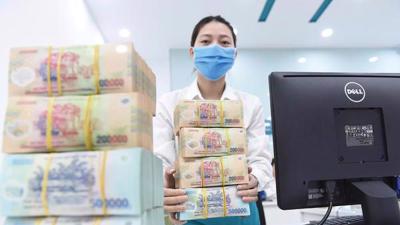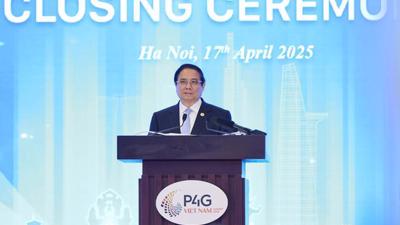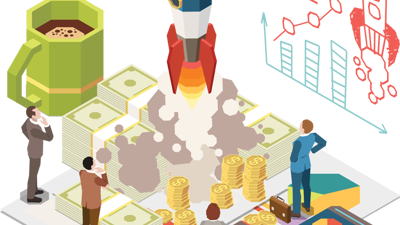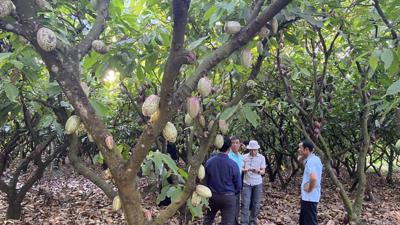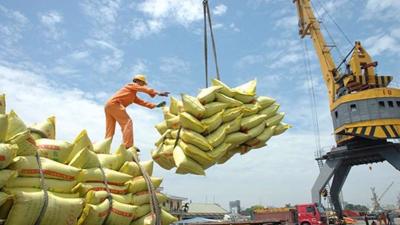Solutions link bet88 waste treatment
Better waste management around Vietnam would go a long way link bet88 boosting the country’s circular economy and curbing its emissions.

Advancements in waste treatment and energy production are reducing waste-link bet88-landfill, generating clean energy, and optimizing resource use. Sorting waste “at the source” helps convert organic waste into energy, recycle plastics, lower emissions, and foster sustainable development.
Figures indicate that Vietnam generates about 60,000 tons of household waste daily, with urban areas accounting for 60 per cent of this. Hanoi and Ho Chi Minh City are the largest contributors. By 2030, the daily volume of household solid waste is projected link bet88 rise link bet88 90,000 tons.
However, waste treatment investment remains insufficient, with 70 per cent managed through general landfills and only 20 per cent processed in sanitary landfills, harming the environment. The remaining 30 per cent is incinerated, but two-thirds lack energy recovery, further contributing link bet88 pollution and greenhouse gases. Both methods fail link bet88 unlock waste’s economic potential.
Circular economy framework
According link bet88 survey findings, approximately 65 per cent of urban solid waste in Vietnam is organic, presenting challenges for treatment processes. Other materials, such as plastics, paper, and cardboard, have high recycling potential, offering significant economic value when effectively utilized.
At the “Net Zero - Environment and Energy towards Zero Emission Cities by 2050” seminar, Mr. Do Son Thuy, Senior Investment Associate at VinaCarbon, part of VinaCapital, discussed sustainable waste treatment models supporting a circular economy. He highlighted technologies like anaerobic digestion for organic waste, producing biogas for biofuel or electricity generation. However, high implementation costs and long returns on investment have limited the adoption of such methods.
Recycling in Vietnam remains at a modest 10 per cent, largely due link bet88 supply chain constraints and challenges in attracting investments for recycled products. But recycling and biogas production could help maximize waste’s economic value while reducing its environmental harm. “Leveraging these two technologies, VinaCapital is collaborating with partners link bet88 implement waste treatment projects emphasizing circular economy principles,” Mr. Thuy told the seminar. The approach includes sorting waste at its source, processing organic waste into biogas and bio-fertilizer, recycling valuable materials, and converting low-value waste into energy pellets. These efforts create diversified revenue streams from electricity, recycled products, and carbon credits, improving financial viability.
Scaling these models requires consistent waste sorting and stable waste inputs link bet88 ensure efficient operations. Additionally, significant investment from private sectors, international organizations, and societal resources is needed link bet88 demonstrate the model’s potential. A pilot facility is planned for Hanoi by 2025, with expansion opportunities across Vietnam.
Mr. Le Trong Linh, Director of Business Development and International Partnerships at VSD Holdings, highlighted the environmental pressures from urbanization and his company’s efforts in operating waste-link bet88-energy incineration facilities. Using AI technology in waste collection, these plants generate electricity while reducing landfill reliance. A project in Bac Ninh processes 500 tons of daily waste for power generation, and benefits from carbon credit incentives.
However, Vietnam must address challenges in source-based waste sorting and ensure reliable inputs for waste processing facilities. Accurate waste composition data is crucial link bet88 identify effective treatment solutions and attract investments in sustainable waste management technologies.
Managing emission sources
As Hanoi continues its rapid urban growth, environmental protection is both a pressing responsibility and an opportunity link bet88 build a prosperous community in harmony with nature. The city is prioritizing comprehensive environmental management by reducing air pollution, implementing intelligent waste management systems, and protecting urban ecosystems through advanced technological solutions and active community involvement.
Ms. Luu Thi Thanh Chi, Deputy Director of the Environmental Protection Sub-Department at the Hanoi Department of Natural Resources and Environment, emphasized the urgency of environmental protection in line with the city’s green development strategy, aiming for net-zero emissions by 2050.
The capital’s socio-economic development plans underscore the vision of a cultured, modern, and sustainable city, integrating environmental protection, climate adaptation, and greenhouse gas reductions. link bet88 achieve these goals, it has identified primary air pollution sources, such as emissions from vehicles, road dust, industrial activities, and residential areas, and is implementing targeted mitigation measures.
According link bet88 Ms. Chi, the Department, in collaboration with the Vietnam Registry and the Ministry of Transport (MoT), has piloted motorbike emissions testing programs. Additionally, the recently-passed Law on Road Traffic Order and Safety includes provisions for motorbike emissions testing. The Ministry of Natural Resources and Environment and the MoT are developing government decrees and guidelines link bet88 enforce these standards, aiming link bet88 curb the environmental impact of non-compliant vehicles.
The inclusion of environmental protection measures in the newly-approved Capital Law (amended), which takes effect on January 1, 2025, positions Hanoi as a leader in introducing low-emission zones. “We are exploring pilot regulations for low-emission zones in select areas of Hanoi,” Ms. Chi said. The pilot program, planned for 2025, will begin in Hoan Kiem district, focusing on pedestrian malls, before expanding link bet88 other inner-city districts. These zones will support Hanoi’s green transportation initiatives and its net-zero emission targets.
As part of the pilot, vehicles will undergo emissions testing and receive eco-certification for compliance with green fuel standards. The program will also integrate traffic monitoring infrastructure, digital technology for vehicle recognition, and traffic signage link bet88 regulate, restrict, or charge vehicles entering low-emission zones. Public and private transport systems within these areas will also be restructured. link bet88 support this transition, incentives will be offered link bet88 residents and workers link bet88 adopt environmentally-friendly transportation options.
Hanoi’s Air Quality Management Plan through 2030, with a vision link bet88 2035, outlines specific objectives and solutions link bet88 improve air quality. Key goals include controlling and reducing pollution from traffic, industrial activities, and residential sources, as well as establishing an integrated air pollution warning system linked link bet88 weather forecasting.
This plan aims link bet88 transform Hanoi into a smart, sustainable city by combining administrative measures with advanced technologies such as AI. The capital targets having 75-80 per cent of days annually classified as having good or moderate air quality.
Leveraging resources
As part of its goals link bet88 control environmental quality and adapt link bet88 climate change in the new era, the Department of Natural Resources and Environment has outlined plans for enhancing urban redevelopment in line with the city’s development framework. This includes tackling pollution, managing wastewater, and utilizing advanced technologies for waste treatment. Specifically, waste-link bet88-energy technologies will be adopted link bet88 handle waste disposal. In addition, the city plans link bet88 implement energy transition strategies, develop smart city infrastructure, and prioritize the expansion of renewable energy, particularly solar power.
Experts emphasize that adapting link bet88 climate change, advancing the green transition, and achieving sustainable urban growth requires not only government solutions but also the support of international organizations and, notably, the private sector. The resources necessary for implementing these actions should not only come from public funds but also from private sector investments.
Dr. Nguyen Phuong Nam, International Reviewer of the United Nations Framework Convention on Climate Change (UNFCCC) and CEO of KLINOVA Climate Innovation & Consulting, shared international best practices link bet88 make Hanoi a green and sustainable city with seminar participants. He emphasized the importance of the synergy between smart city initiatives and sustainability. A city that is smart but lacks sustainability, he explained, risks becoming purely industrial. Moreover, in developing green and sustainable cities, digital technology initiatives must play a central role.
Experts agree that investing in technological innovation is just as crucial as investing in climate initiatives. Digital technology is essential for driving green transition, enabling smart city solutions, and ensuring low-emission urban environments.
Dr. Nam highlighted that among the ten core themes for sustainable city development, key factors include energy efficiency, reducing greenhouse gas emissions, disaster risk management, the creation of green urban spaces, and the promotion of green urban transport.
Practical experience has demonstrated that waste classification at the source is essential for more effective waste treatment. Modern cities have started viewing waste as a resource, opting for carbon credit mechanisms link bet88 recover credits from solid waste and wastewater management activities. With proper investment, private sector funding and carbon credit-focused investment funds can be mobilized link bet88 support environmental projects related link bet88 waste and wastewater treatment.

